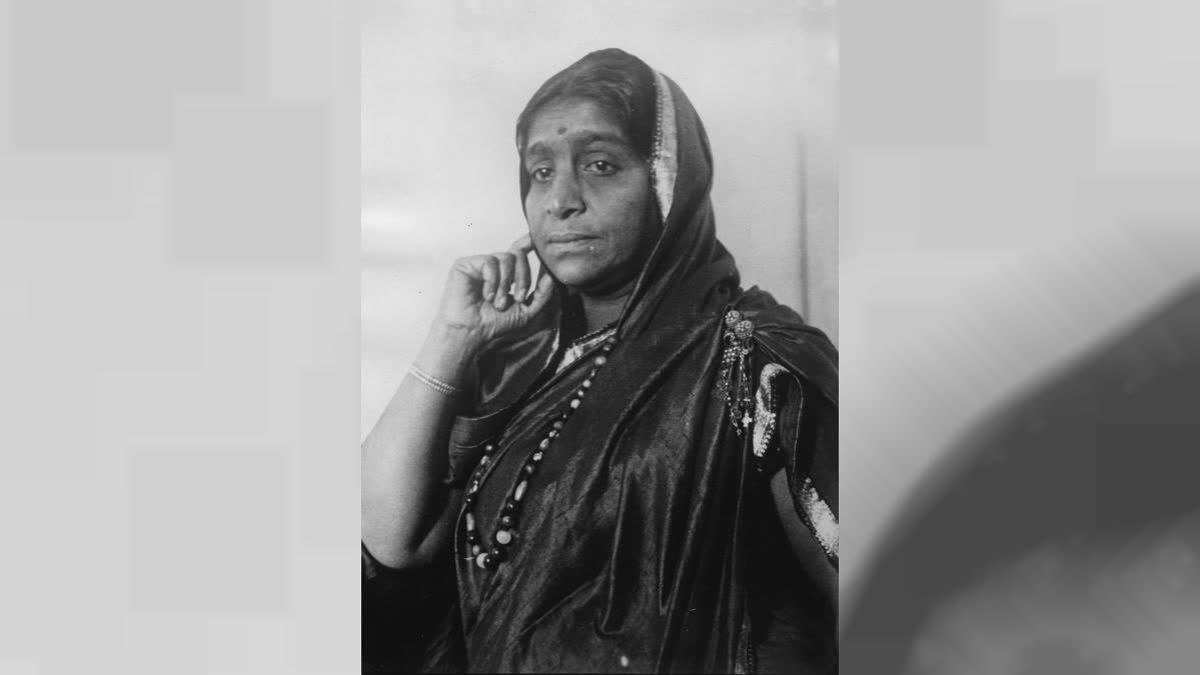Hyderabad: March 2 is remembered as the death anniversary of Sarojini Naidu, who was known as 'the Nightingale of India' or 'Bharat Kokila'.
Sarojini Naidu was a famous poetess, freedom fighter, social activist and great speaker of her time. She became the first woman Governor of the United Provinces, which is now the present state of Uttar Pradesh.
Sarojini Naidu in her childhood wrote a play "Maher Muneer" and due to it she earned a scholarship and went abroad for further studies. She was remembered as a great leader and also was one of the members of the Constituent Assembly. She died on March 2, 1949, due to cardiac arrest at the Government House in Lucknow.
Early Life - Sarojini Naidu was born in Hyderabad and was the eldest daughter of Aghornath Chattopadhyaya, a scientist, philosopher, and educator, and Varada Sundari Devi, a Bengali poet. Her father was the founder of Nizam College, Hyderabad and, with his friend Mulla Abdul Qayyum, was also the first member of the Indian National Congress in Hyderabad. Urdu, Telugu, English, Persian, and Bengali were studied by Sarojini Naidu.
At the age of 12, she gained national renown for joining Madras University. She moved to England at sixteen, first to study at King's College London and then at Girton College, Cambridge. She was associated with the Suffragette movement while in England. In 1905, her first poetry book, The Golden Threshold, appeared. Her poems featured daily scenes of Indian life. It was in 1905, in protest over the partition of Bengal, that she joined the Indian National Congress. She was a strong advocate of the rights of women, a proponent of education for all, and of the unity of Hindu-Muslims.
Notable Literary Works - Her literary legacy is marked by a collection of works that beautifully capture the essence of Indian culture, landscapes, and the spirit of its freedom struggle. Her involvement in the national movement influenced her writing, and her poetry began to reflect a stronger sense of nationalism and a subtle critique of colonial rule. Over time, her poetry also began to address social and political issues more directly, particularly those concerning women’s rights and women's empowerment.
Major literary works: The Golden Threshold: This was Sarojini Naidu’s first collection of poems and was published in 1905 and is named after her family home in Hyderabad.
The Bird of Time: Published in 1912, this collection features patriotic pieces that reflect her deep love for her country.
The Broken Wing: This collection is known for including one of her most famous poems 'In the Bazaars of Hyderabad'.
The Sceptred Flute(1928): Songs of India: This anthology of her poems was published after her death and includes verses that artfully weave the essence of Indian tradition with the English language.
The Feather of The Dawn: Published in 1961, this was edited by her daughter Padmaja Naidu. This collection comprises previously unpublished poems by Sarojini Naidu.
Some other Books: Palanquin Bearers, Speeches and Writings of Sarojini Naidu. Muhammad Jinnah: An Ambassador of Unity, The Broken Wing: Songs of Love, Death and the Spring, The Gift of India, The Indian Weavers, The Sceptred Flute: Songs of India.
Contributions to the Freedom Struggle - Gopal Krishna Gokhale played a crucial role in drawing her closer to the freedom movement. Inspired by his ideals and dedication, Naidu decided to dedicate her life to the cause of India’s independence.
She formally joined the Indian national movement during the anti-partition of Bengal in 1905. Her encounter with Mahatma Gandhi further enhanced her engagement in the freedom struggle. Gandhi’s philosophy of non-violence and civil disobedience deeply resonated with her, and she became one of his closest associates and supporters.
Naidu took an active part in the Non-Cooperation Movement launched in 1920. She was arrested several times during the Non-Cooperation Movement.
In recognition of her role in the Indian independence movement, Naidu was appointed as the President of the Indian National Congress in Kanpur Session 1925. She was the first Indian woman and overall the second woman (after Annie Besant) to serve as the President of the Indian National Congress.
Her presidency marked a significant milestone in recognizing the role of women in the Indian independence movement. She played a pivotal role in the Civil Disobedience Movement and the Salt Satyagraha of 1930. She led the Dharasana Satyagraha after Gandhi’s arrest, showcasing her courage to face colonial repression.
Naidu accompanied Gandhi to London for the second Round Table Conference held in 1931. Sarojini Naidu registered her participation in Quit India Movement launched in 1942.
She is known for championing the cause of women’s rights in India. She travelled to different countries to mobilise support for the freedom struggle. She also represented India at various international forums, where she advocated for the Indian independence movement and women’s rights.
Inspiring quotes by Sarojini Naidu - To quench my longing I bent me low/ By the streams of the spirits of Peace that flow/ In that magical wood in the land of sleep.
We want deeper sincerity of motive, a greater courage in speech and earnestness in action.
A country’s greatness lies in its undying ideals of love and sacrifice that inspire the mothers of the race.
Her childhood residence at Nampally was bequeathed to the University of Hyderabad by her family and it was christened as 'The Golden Threshold'. The University renamed its School of Fine Arts and Communication as ‘Sarojini Naidu School of Arts and Communication’ to her.



